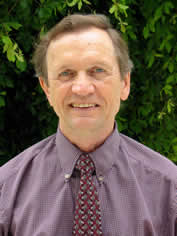 David Wilson
David Wilson
PROFESSOR
EDUCATION AND PROFESSIONAL EXPERIENCE
I obtained my B.S. degree in physics from the University of Maryland and Ph.D. degree in biophysics from the University of Chicago. After postdoctoral research as a fellow at Caltech, I joined the faculty at the University of Miami in 1972. I currently have a secondary appointment in the Department of Physiology and Biophysics at the School of Medicine. I have served as Dean of the College of Arts and Sciences, Deputy Dean for Academic Affairs at the School of Medicine, Chair of the Faculty Senate, Interim Dean of the Graduate School, Associate Provost for Research, Associate Provost for Instructional Advancement, and Director of the Undergraduate Neuroscience Program. I am a former bicycle racer and five-time State champion who continues to enjoy cycling as a hobby.
AWARDS
- University of Miami Excellence in Teaching award (2006)
- Iron Arrow Honor Society (2003)
- AAAS Fellow (2003)
- Fellow of the Gerontological Society of America (2002)
- James W. McLamore Outstanding Service Award (2001)
- Outstanding Biology Educator Award, Biology Dept. (2001)
- Tri-Beta Professor of the Month (Sept. 2000)
- Phi Beta Kappa (2000) Honorary member
- A "Best of Miami" Best Educator, Miami Today (1999)
- Univ. of Miami Nominee, CASE professor-of-the-year (1994)
- University of Miami Excellence-in-Teaching Award (1994)
- Phi Kappa Phi (1989) Honorary member
- May A. Brunson Award, Univ. of Miami Women's Commission (1988)
- Omicron Delta Kappa (1985) Honorary member
- Helen Hay Whitney Postdoctoral Fellowship (1969-1972)
- James Franck Dissertation Fellowship (1968-1969)
- National Institutes of Health Predoctoral Fellowship (1964-1968)
- B.S. degree with honors and honors in Physics (1964)
- National Sciences Foundation undergraduate research program (1963-1964)
- Sigma Pi Sigma (Physics) (1963)
- Pi Mu Epsilon (Mathematics) (1963)
GRANTS
- American Federation for Aging Research (1993-1995) Can aging andmortality be reduced by blocking the function of particular genes late in life?
- Conference Grants (NSF, ONR, and AFOSR) (1987) Gordon Conference onNeural Plasticity
- NIH research grant NS18263 (1983-1986) Biochemistry of nerve regeneration
- NSF research grant BNS-8117817 (1982-1985) Axonal transport and the destination of proteins
- National Parkinson Foundation (1982-1983) Growth factors with highaffinity for nigrostriatal dopaminergic neurons
- NIH training grant NS07044 (1980-1985) Neuroscience - program director
- NIH research grant NS14328 (1978-1982) Axoplasmic transport of
- the nervous system
- NIH research grant NS12393 (1975-1979) Control of protein synthesis in proteins
- NIH research grant NS10428 (1972-1974) Aplysia neuron proteins
AREAS OF FOCUS
- Development and Neuroscience
- Mathematical and Theoretical Biology
RESEARCH INTERESTS
Two problems in biology continue to fascinate me. One of these is the biology of aging. My lab has isolated several mutants in the nematode C. elegans that show extended life expectancy. I also have contributed to our knowledge of the biodemography of aging. Our modern understanding of why and how we age is likely to lead (in the next 20-40 years) to methods for extending human life spans to 150 years or more. We need to begin to prepare for the considerable disruptions in society and our environment that will result.
A second, long-standing problem is the biology of consciousness and mind. The relationship between mind and brain, and the way that brain activity generates consciousness are challenging puzzles and central to what it means to be human. Advances in neuroscience are contributing to new views of these ancient problems.
I am a fellow of the American Association for the Advancement of Science and the Gerontological Society of America
TEACHING INTERESTS
I love both learning and teaching. I regularly teach the first semester of the introductory biology major’s course (BIL 150). It is a challenging introduction to molecular and cellular biology, genetics, and aspects of physiology. At heart, I’m a generalist, so I enjoy keeping up with all of the areas necessary to do a good job of teaching such a broad-based course.
I often teach upper-division courses in the biology of aging (BIL 369, BIL 569) as well as a course introducing neuroscience majors to research (PSY 120). The biology of aging courses force students to integrate the knowledge they have gained in evolution, physiology, cell biology, and genetics. They also require students to think about topics ranging from age-related diseases to demographics.
I especially enjoy helping students think across disciplinary boundaries, and that is reflected in some of the classes I have occasionally taught, including a course in science and literature with Dr. Zack Bowen of the English Department and a course covering the cultural and biological aspects of aging with Dr. Steve Sapp of the Religious Studies Department. I frequently have taught learning communities with Dr. Lynn Durel in the Psychology Department. We bring together students who are studying biology and psychology for stimulating exchanges.
I have twice been given the University of Miami’s Excellence in Teaching Award and also the Biology Department’s Outstanding Biology Educator Award
SELECTED PUBLICATIONS
- Wilson, D.L. 2010. Intelligent Design Creationism: Not Science but Nonsense. Florida Science Matters (submitted)
- Wilson, D.L. 2009. Slowing Human Aging. Quality in Ageing—Policy, Practice, and Research 10(issue 2): 23-9.
- Wilson, D.L. 2008. Reducing Human Aging: Clues from How and Why We Age. (a book- length monograph of 13 chapters plus preface and bibliography) www.bio.miami.edu/dwilson/
- Wilson and Bowen, 2001, Science and Literature: Bridging the Two Cultures, University Press of Florida, Gainesville, 252 + xiii pp.
- Yang and Wilson, 2000, Isolating aging mutants: a novel method yields three strains of the nematode C. elegans with extended life spans. Mechanisms of Ageing and Development 113, 101-16
- Wilson, 2000, Introduction to Biology. Blackwell Science, Malden, MA, 278 + ix pp.



 David Wilson
David Wilson